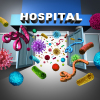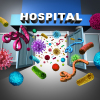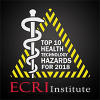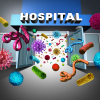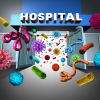Collision course on antibiotic resistance and HAIs
November 15, 2016
Infection Control
Population Health
From the November 2016 issue of HealthCare Business News magazine
• Prescribe antibiotics appropriately
Assign a staff professional to remind physicians to prescribe antibiotics only when necessary. This is perhaps the single most important action that needs to be taken to greatly slow down the development and spread of antibiotic-resistant infections. According to the CDC, up to half of the antibiotics used by humans are unnecessary, inappropriate and make everyone less safe. Prescribe or administer the appropriate antibiotics to combat this issue.
• Develop new antibiotic drugs


Stay ahead of the game by sharing medical research with the medical staff concerning new drugs and how to appropriately use them. Although antibiotic resistance will continuously evolve with bacteria, health care personnel will always need new antibiotics to keep up with the resistant bacteria. Developing new diagnostic tests to track the development of resistance plays an equal role in slowing down the spread of resistant bacteria.
When used appropriately, antibiotics are effective drugs that fight bacterial infections. The overuse and misuse of antibiotics has led to a decrease in antibiotic effectiveness and the resistance of some microorganisms to these drugs. Researchers believe we are heading toward a cliff if overuse continues, and treatable disease will once again become untreatable. Similarly, HAIs must be reduced since they often lead to prolonged illness and sometimes death. Hospital personnel must continually educate all of their internal teams concerning safe work practices within all areas of the health care facility. Infection control and prevention training must be continual to work toward changing bad habits and developing new ones.
We have all heard the constant rant concerning hand washing, but recently I attended an in-service training meeting with the environmental services staff at a major hospital. One EVS staff member who attended the meeting entered the board room after disinfecting a patient room with his used gloves still on his hands. When I questioned him about it, he responded with, “Oh, I forgot,” and took them off. He had already touched a variety of surfaces in a room where many people come in contact with those surfaces.
About the author: Thom Wellington is the CEO and a stockholder in Infection Control University, a company that provides staff training programs and control processes for infectious microorganisms in hospitals, clinics, long-term care facilities and other health care-related institutions.
Back to HCB News
• Prescribe antibiotics appropriately
Assign a staff professional to remind physicians to prescribe antibiotics only when necessary. This is perhaps the single most important action that needs to be taken to greatly slow down the development and spread of antibiotic-resistant infections. According to the CDC, up to half of the antibiotics used by humans are unnecessary, inappropriate and make everyone less safe. Prescribe or administer the appropriate antibiotics to combat this issue.
• Develop new antibiotic drugs
Your Trusted Source for Sony Medical Displays, Printers & More!
Ampronix, a Top Master Distributor for Sony Medical, provides Sales, Service & Exchanges for Sony Surgical Displays, Printers, & More. Rely on Us for Expert Support Tailored to Your Needs. Email info@ampronix.com or Call 949-273-8000 for Premier Pricing.

Stay ahead of the game by sharing medical research with the medical staff concerning new drugs and how to appropriately use them. Although antibiotic resistance will continuously evolve with bacteria, health care personnel will always need new antibiotics to keep up with the resistant bacteria. Developing new diagnostic tests to track the development of resistance plays an equal role in slowing down the spread of resistant bacteria.
When used appropriately, antibiotics are effective drugs that fight bacterial infections. The overuse and misuse of antibiotics has led to a decrease in antibiotic effectiveness and the resistance of some microorganisms to these drugs. Researchers believe we are heading toward a cliff if overuse continues, and treatable disease will once again become untreatable. Similarly, HAIs must be reduced since they often lead to prolonged illness and sometimes death. Hospital personnel must continually educate all of their internal teams concerning safe work practices within all areas of the health care facility. Infection control and prevention training must be continual to work toward changing bad habits and developing new ones.
We have all heard the constant rant concerning hand washing, but recently I attended an in-service training meeting with the environmental services staff at a major hospital. One EVS staff member who attended the meeting entered the board room after disinfecting a patient room with his used gloves still on his hands. When I questioned him about it, he responded with, “Oh, I forgot,” and took them off. He had already touched a variety of surfaces in a room where many people come in contact with those surfaces.
About the author: Thom Wellington is the CEO and a stockholder in Infection Control University, a company that provides staff training programs and control processes for infectious microorganisms in hospitals, clinics, long-term care facilities and other health care-related institutions.
Back to HCB News
2(current)
You Must Be Logged In To Post A CommentRegisterRegistration is Free and Easy. Enjoy the benefits of The World's Leading New & Used Medical Equipment Marketplace. Register Now! |
|


